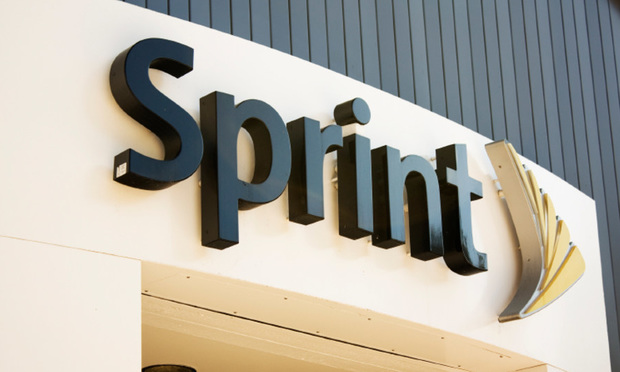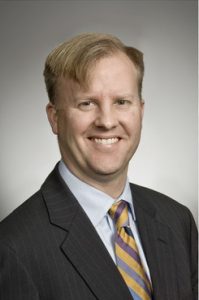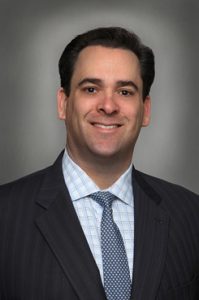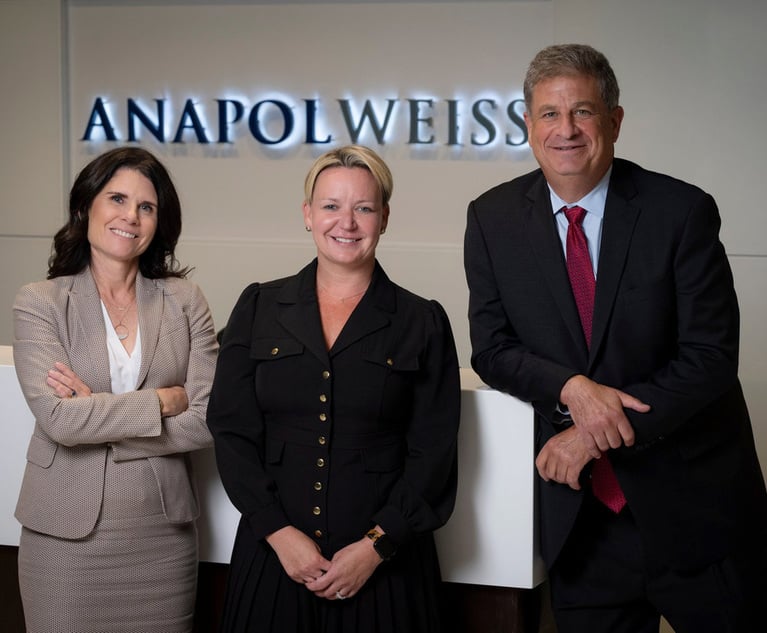Why the Sprint-T-Mobile Merger Is a 'Deal M&A Lawyers Live For'
A big, complex, cross-border transaction is nectar for deal lawyers like the ones at Morrison & Foerster representing Sprint.
May 04, 2018 at 01:36 PM
4 minute read
The original version of this story was published on The American Lawyer

The proposed mega-merger between Sprint Corp. and T-Mobile USA Inc. could transform the U.S. telecommunications sector.
The $26.5 billion deal is also going to transform the next several months—at least—for Brandon Parris, a Morrison & Foerster corporate partner and former co-chair of the firm's global corporate department.
 Brandon Parris.
Brandon Parris. “This is the kind of deal that M&A lawyers live for,” Parris said. “It's very big and extremely complicated. There are two big public companies, each controlled by a stockholder from a different country, so it's complicated and cross-border.”
Along with Robert Townsend, co-chair of the firm's global M&A practice, and David Slotkin, who co-chairs its corporate finance and REIT practices, Parris is leading the 30-lawyer team representing Sprint and its largest shareholder, longtime MoFo client SoftBank.
If the merger receives shareholder and regulatory approval, the combined $146 billion company will create a U.S. telecommunications rival to industry leaders AT&T Inc. and Verizon Communications Inc.
Wachtell, Lipton, Rosen & Katz, led by partners Adam Emmerich and David Lam, is advising T-Mobile and its owner Deutsche Telekom. At last count, 18 law firms are working on the deal. Emmerich and Lam did not respond to requests for interviews.
 Robert Townsend.
Robert Townsend. “It wasn't a forgone conclusion” that Morrison & Foerster would win the lead role for Sprint and Softbank, Parris said, even though his firm had advised Softbank when it purchased its controlling interest in Sprint, and has represented the Japanese company on investments in Uber Technologies Inc.
and other companies.
But “as this deal began to heat up,” Parris said, the conversations with the client made it clear MoFo was being considered for the lead.
The negotiating teams have overcome significant hurdles already, and Parris said he expects the lawyers to face more as regulators nationwide pore over the deal.
“A deal of this size and complexity, getting the parties to agree created its own challenges, and the next phase of this certainly will have its own challenges,” he said.
To get to the point where both sides were ready to go forward, the companies had to resolve Deutsche Telekom's goal of having the newly merged company's financials consolidated with its own, even though it would not have a majority stake in the company when the deal closed, Parris said.
 David Slotkin.
David Slotkin. “We had to get that through contractual obligations,” he said. The other initial challenge was how much debt the two companies together share—$67 billion, by Parris' calculation.
The deal, however, has the strategic advantage of regulatory familiarity—a potential boost given the Trump administration's wariness of foreign stakeholders assuming control of U.S.-based technology companies, Parris said. Only six years ago, when a MoFo team represented Tokyo-based SoftBank in its 2012 investment to acquire a 70 percent stake in Sprint, in a transaction valued at $45 billion, the deal required approval from the Committee on Foreign Investment in the United States (CFIUS).
“It was pretty thoroughly reviewed with CFIUS,” Parris said of that deal. Since then, he said, “Sprint has maintained an extremely good and open relationship” with CFIUS officials.
Notably, however, those regulators now answer to President Donald Trump's White House rather than by former President Barack Obama's.
Under the Obama administration, the U.S. Department of Justice signaled that it would not look favorably on a marriage of Sprint and T-Mobile. The change in administrations has not vanquished all those voices, but Townsend noted the atmosphere has changed.
“We expect there are people in the Department of Justice that have a developed point of view,” Townsend said, declining to elaborate.
Townsend also cited the advantages gained from his firm's and Softbank's prior experience with CFIUS. “We have a great deal of experience with CFIUS, and they know the participants in this deal, so we hope the review will go well,” he said.
Not surprisingly, Townsend downplayed the antitrust concerns swirling about the deal, and touted its advantages. The newly merged company would have resources to develop 5G technology cellular service and take telecommunications in this country to a new level, he said. This is a significant point, since the United States is behind other countries, such as China, where the government has invested in wireless, he added.
“It this transaction is approved, it will be transformational to the wireless infrastructure in this country,” Townsend said.
This content has been archived. It is available through our partners, LexisNexis® and Bloomberg Law.
To view this content, please continue to their sites.
Not a Lexis Subscriber?
Subscribe Now
Not a Bloomberg Law Subscriber?
Subscribe Now
NOT FOR REPRINT
© 2025 ALM Global, LLC, All Rights Reserved. Request academic re-use from www.copyright.com. All other uses, submit a request to [email protected]. For more information visit Asset & Logo Licensing.
You Might Like
View All
Once the LA Fires Are Extinguished, Expect the Litigation to Unfold for Years
5 minute read

Faegre Drinker Adds Three Former Federal Prosecutors From Greenberg Traurig
4 minute read
Anapol Weiss Acquires Boutique Led by Star Litigator Alexandra Walsh
5 minute readTrending Stories
- 1Some Thoughts on What It Takes to Connect With Millennial Jurors
- 2Artificial Wisdom or Automated Folly? Practical Considerations for Arbitration Practitioners to Address the AI Conundrum
- 3The New Global M&A Kings All Have Something in Common
- 4Big Law Aims to Make DEI Less Divisive in Trump's Second Term
- 5Public Notices/Calendars
Who Got The Work
J. Brugh Lower of Gibbons has entered an appearance for industrial equipment supplier Devco Corporation in a pending trademark infringement lawsuit. The suit, accusing the defendant of selling knock-off Graco products, was filed Dec. 18 in New Jersey District Court by Rivkin Radler on behalf of Graco Inc. and Graco Minnesota. The case, assigned to U.S. District Judge Zahid N. Quraishi, is 3:24-cv-11294, Graco Inc. et al v. Devco Corporation.
Who Got The Work
Rebecca Maller-Stein and Kent A. Yalowitz of Arnold & Porter Kaye Scholer have entered their appearances for Hanaco Venture Capital and its executives, Lior Prosor and David Frankel, in a pending securities lawsuit. The action, filed on Dec. 24 in New York Southern District Court by Zell, Aron & Co. on behalf of Goldeneye Advisors, accuses the defendants of negligently and fraudulently managing the plaintiff's $1 million investment. The case, assigned to U.S. District Judge Vernon S. Broderick, is 1:24-cv-09918, Goldeneye Advisors, LLC v. Hanaco Venture Capital, Ltd. et al.
Who Got The Work
Attorneys from A&O Shearman has stepped in as defense counsel for Toronto-Dominion Bank and other defendants in a pending securities class action. The suit, filed Dec. 11 in New York Southern District Court by Bleichmar Fonti & Auld, accuses the defendants of concealing the bank's 'pervasive' deficiencies in regards to its compliance with the Bank Secrecy Act and the quality of its anti-money laundering controls. The case, assigned to U.S. District Judge Arun Subramanian, is 1:24-cv-09445, Gonzalez v. The Toronto-Dominion Bank et al.
Who Got The Work
Crown Castle International, a Pennsylvania company providing shared communications infrastructure, has turned to Luke D. Wolf of Gordon Rees Scully Mansukhani to fend off a pending breach-of-contract lawsuit. The court action, filed Nov. 25 in Michigan Eastern District Court by Hooper Hathaway PC on behalf of The Town Residences LLC, accuses Crown Castle of failing to transfer approximately $30,000 in utility payments from T-Mobile in breach of a roof-top lease and assignment agreement. The case, assigned to U.S. District Judge Susan K. Declercq, is 2:24-cv-13131, The Town Residences LLC v. T-Mobile US, Inc. et al.
Who Got The Work
Wilfred P. Coronato and Daniel M. Schwartz of McCarter & English have stepped in as defense counsel to Electrolux Home Products Inc. in a pending product liability lawsuit. The court action, filed Nov. 26 in New York Eastern District Court by Poulos Lopiccolo PC and Nagel Rice LLP on behalf of David Stern, alleges that the defendant's refrigerators’ drawers and shelving repeatedly break and fall apart within months after purchase. The case, assigned to U.S. District Judge Joan M. Azrack, is 2:24-cv-08204, Stern v. Electrolux Home Products, Inc.
Featured Firms
Law Offices of Gary Martin Hays & Associates, P.C.
(470) 294-1674
Law Offices of Mark E. Salomone
(857) 444-6468
Smith & Hassler
(713) 739-1250






